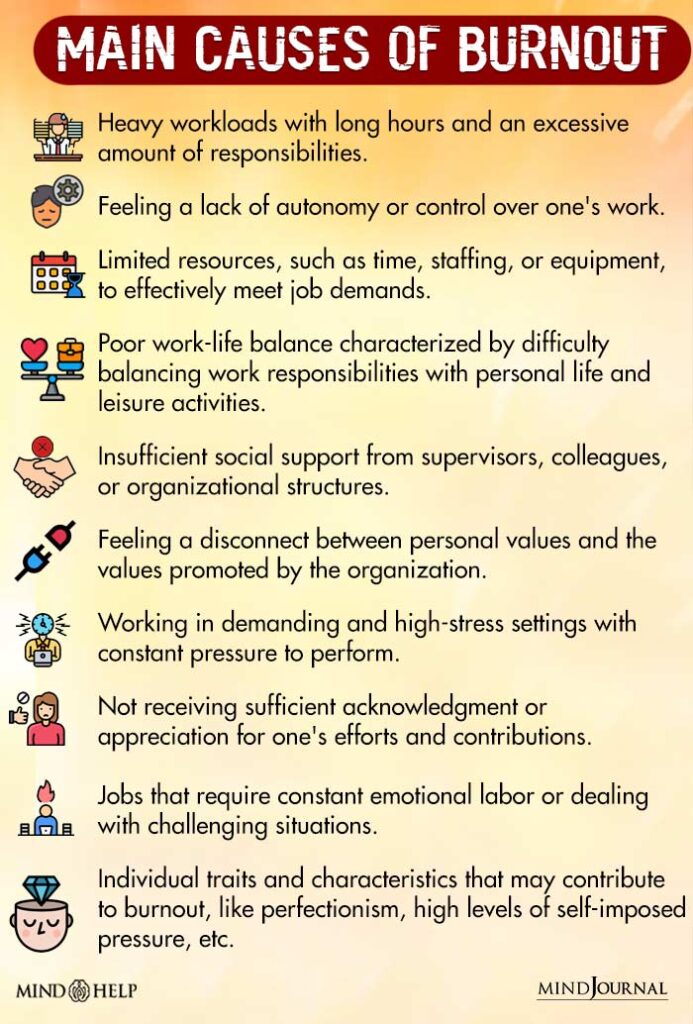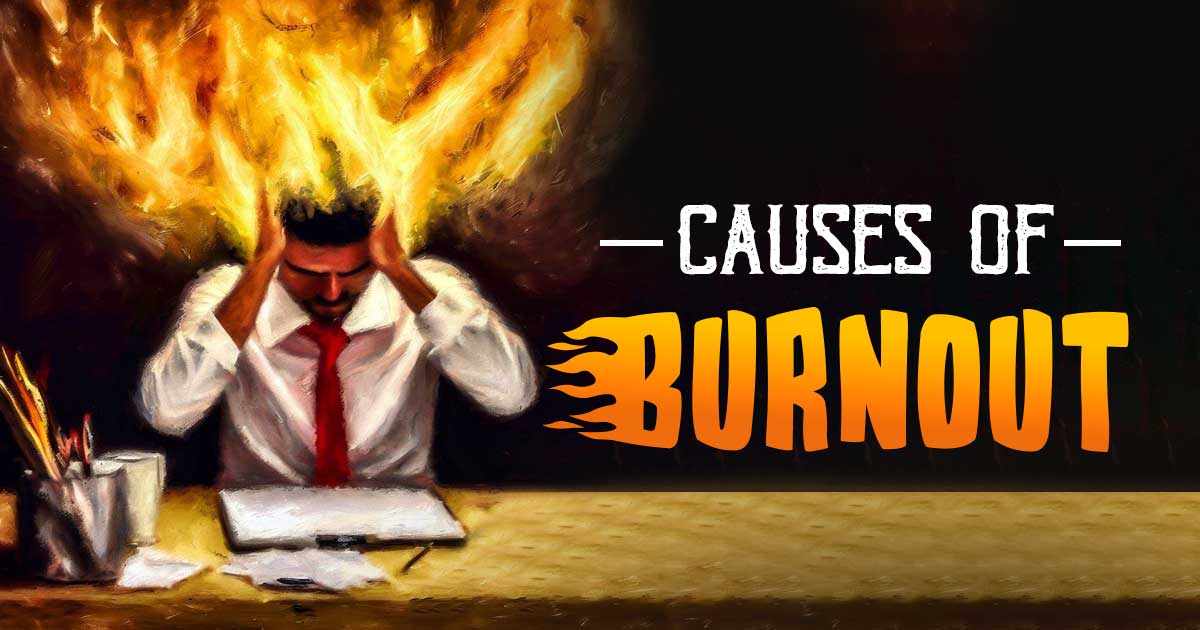Burnout syndrome is a state of chronic physical and emotional exhaustion 1 Maslach, C., & Leiter, M. P. (2016). Understanding the burnout experience: recent research and its implications for psychiatry. World psychiatry : official journal of the World Psychiatric Association (WPA), 15(2), 103–111. https://doi.org/10.1002/wps.20311 caused by prolonged stress and excessive work demands. The common causes of burnout are primarily seen in individuals who are passionate about their work and have high levels of dedication.
Burnout is commonly observed in professions that involve high levels of responsibility, such as healthcare, education, social work, and corporate settings. Statistics on its causes can vary depending on the study and population surveyed.
For example, a survey conducted by Gallup in 2021 2 Wigert, B., & Agrawal, S. (2018, July 12). Employee Burnout, Part 1: The 5 Main Causes. Gallup.com. Available from: https://www.gallup.com/workplace/237059/employee-burnout-part-main-causes.aspx found that the most common cause of burnout among American workers was unmanageable workload (53%), followed by lack of work-life balance (45%), and unclear or unfair job expectations (34%).
Main Causes Of Burnout In Different Settings
Burnout triggers occur in every setting, personal and professional. The predominant burnout syndrome causes at home, school, the workplace, and in clinical settings include:
1. Causes of caregiver burnout
Caregivers 3 Singh, R., Tadi, P., & Marlowe, D. (2020). Provider Burnout. PubMed; StatPearls Publishing. Available from: https://www.ncbi.nlm.nih.gov/books/NBK538330/ often experience burnout due to a variety of factors, including:
- The demanding nature of caregiving responsibilities, such as providing constant physical and emotional support
- Lack of support from other family members or a limited support network can further contribute to the strain
- The emotional toll of witnessing the decline or suffering of the person they are caring for
- Financial burdens
- Disruptions to personal life and relationships
- Neglecting one’s own self-care needs
2. Causes of burnout at school/in the academia
Burnout can affect both students and teachers in educational settings 4 March-Amengual, J. M., Cambra Badii, I., Casas-Baroy, J. C., Altarriba, C., Comella Company, A., Pujol-Farriols, R., Baños, J. E., Galbany-Estragués, P., & Comella Cayuela, A. (2022). Psychological Distress, Burnout, and Academic Performance in First Year College Students. International journal of environmental research and public health, 19(6), 3356. https://doi.org/10.3390/ijerph19063356 . The causes of burnout in students may include:
- Excessive academic pressure, unrealistic expectations, and an overwhelming workload
- A lack of support or resources
- Difficulty in managing multiple responsibilities
- High levels of competition
- Personal problems related to family, relationships, etc.
Teachers can also experience burnout. The main causes of teacher burnout include:
- Heavy workloads, including lesson planning, grading, and administrative tasks
- Lack of autonomy in decision-making
- Limited professional development opportunities
- Inadequate support from school administration
- Challenging student behaviors and demanding parents
- The emotional toll of the teaching profession
3. Causes of burnout in the workplace
Burnout in the workplace can arise from various causes 5 Rapisarda, F., Vallarino, M., Brousseau-Paradis, C., Benedictis, L., Corbière, M., Villotti, P., Cavallini, E., Briand, C., Cailhol, L., & Lesage, A. (2022). Workplace Factors, Burnout Signs, and Clinical Mental Health Symptoms among Mental Health Workers in Lombardy and Quebec during the First Wave of COVID-19. International journal of environmental research and public health, 19(7), 3806. https://doi.org/10.3390/ijerph19073806 for both employers and employees. Employers often contribute to burnout through poor management practices, insufficient resources, and a failure to prioritize work-life balance initiatives. In fact, the chief causes of employee burnout lie in:
- Work overload and long working hours
- Toxic work cultures
- Inadequate communication
- A lack of support from colleagues and employers
- Unrealistic professional expectations
- A lack of work-life balance
- A lack of control over work and a lack of recognition or appreciation
Read More About Workplace Stress Here
4. Causes of burnout in mental health professionals
Mental health professionals 6 De Hert S. (2020). Burnout in Healthcare Workers: Prevalence, Impact and Preventative Strategies. Local and regional anesthesia, 13, 171–183. https://doi.org/10.2147/LRA.S240564 are particularly susceptible to burnout due to the nature of their work. Causes of burnout in mental health professionals include:
- Heavy workloads and long hours
- Constant exposure to clients’ distressing stories and traumatic experiences
- High levels of responsibility
- Continuously showing empathy to the clients
- Pressure to meet client needs
- The difficulty of maintaining professional boundaries
- A lack of self-care and limited support systems within the workplace

Risk Factors That Contribute To Burnout
The main risk factors that contribute to burnout syndrome causes include 7 Al-Haddad, A., Al-Omar, F., Al-Khaleel, A., & Al-Khalaf, A. (2020). Prevalence of burnout syndrome and its related risk factors among physicians working in primary health care centers of the Ministry of Health, Al Ahsa region, Saudi Arabia, 2018-2019. Journal of family medicine and primary care, 9(2), 571–579. https://doi.org/10.4103/jfmpc.jfmpc_743_19 :
- Lack of control over one’s job responsibilities
- Unclear job expectations or poor work structure
- Dysfunctional workplace dynamics
- Extremes of occupational demands
- Lack of social support at work
- Work-life imbalances
- Mental health disorders (like depression, anxiety, etc.)
Read More About Depression Here
Job Burnout vs Job Rust-out
The lesser-known peer of job burnout is job rust-out, meaning a state wherein employees experience a decline in professional abilities. While both terms refer to adverse workplace conditions affecting job performance and employees’ mental health 8 Maslach, C., & Leiter, M. P. (2016). Understanding the burnout experience: recent research and its implications for psychiatry. World psychiatry : official journal of the World Psychiatric Association (WPA), 15(2), 103–111. https://doi.org/10.1002/wps.20311 , they have distinct characteristics and therefore it is essential to differentiate between the two.
Job burnout typically arises from excessive workload, stress, and burnout, leading to a temporary decrease in motivation and engagement. On the other hand, job rust is a gradual decline in skills and effectiveness resulting from complacency, lack of growth, and stagnation.
Unlike burnout, rust-out often occurs when individuals fail to update their skills, adapt to changes in their industry, or pursue ongoing professional development.
Tips To Overcome Burnout
Burnout is detrimental to our mental health, but it can be easily addressed with a number of measures that involves:
- Recognizing and acknowledging the signs 9 Lee, F. J., Stewart, M., & Brown, J. B. (2008). Stress, burnout, and strategies for reducing them: what’s the situation among Canadian family physicians?. Canadian family physician Medecin de famille canadien, 54(2), 234–235. of burnout
- Seeking support from trusted individuals or professionals
- Evaluating and adjusting work-related factors (such as time and deadline management)
- Prioritizing self-care and setting boundaries
- Developing healthy coping mechanisms (like engaging in hobbies, journaling, etc.)
- Building a support network at home and in the workplace
- Taking time off work to recharge
Takeaway
If you suspect that you or someone you care about is experiencing burnout syndrome, it is crucial to seek help promptly. Reach out to a trusted friend or family member to discuss your thoughts and emotions, or consider consulting a doctor or mental health professional for guidance and support.
Additionally, prioritizing self-care and attending to your physical, mental, and emotional needs is vital. By following these steps, individuals can address the underlying causes of burnout and promote their well-being and recovery.
At A Glance
- Burnout syndrome is caused by prolonged stress and excessive work demands, primarily affecting individuals who are passionate and dedicated to their work.
- The main causes of burnout include heavy workloads, lack of control, poor work-life balance, limited resources, and insufficient social support.
- Overcoming burnout involves recognizing the signs, seeking support, evaluating work-related factors, setting boundaries, developing coping mechanisms, building a support network, and taking time off.
- Seeking help and prioritizing self-care are the foremost tips to overcome burnout and promote well-being.
Frequently Asked Questions (FAQs)
1. What behavior leads to burnout?
Behavior such as tight schedules in work, high-stress levels, and lack of self-care can lead to burnout.
2. How can I stop burnout?
You can stop burnout by setting boundaries, prioritizing self-care, and practicing stress-management techniques.
3. How can I overcome burnout in life?
To overcome burnout in life, it’s important to take breaks, seek support from loved ones, engage in activities you enjoy, and consider seeking professional help if needed.











